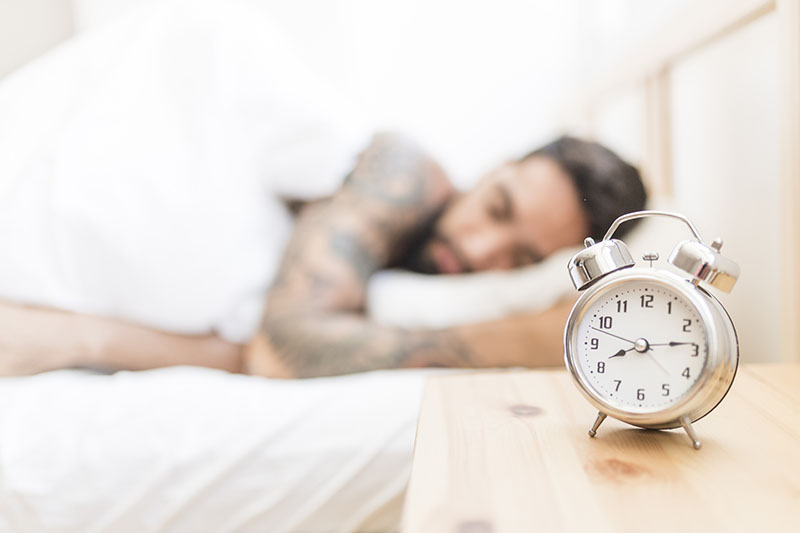Being unable to sleep may be irritating and have ramifications for the following day. A few natural methods may help folks sleep quicker than they would otherwise. This article highlights restriction of sleep as a therapy, establishment of a regular sleep schedule, avoiding caffeine, and other methods as ways to sleep faster.
It takes between ten and twenty minutes for most people to go to sleep. There is no need to panic if you see a difference in behavior amongst persons, but if you find it difficult to fall asleep regularly, you may have a sleep condition like insomnia. When people have difficulty getting to sleep, they might try taking medicine to help them sleep. There is a downside to the long-term use of these drugs. Consistent nighttime routines, avoiding electronic displays, reading and light exercise throughout the day, and practicing mindfulness techniques may all assist. An individual must spend time and effort testing several options to discover what works best.
RESTRICTION OF SLEEP AS A THERAPY
People often use this treatment in conjunction with stimuli control. According to Edinger et al. (2021), the amount of time spent in bed is restricted by the patient’s specific sleep requirements in sleep restriction treatment. People who spend 9 hours in bed but only get 7 hours sleep should limit themselves to 7 hours every night. People can start by maintaining a sleep journal to determine how much sleep they receive on average. Add 30 minutes to the average sleep time to account for falling asleep. Working with a doctor or sleep expert might be beneficial when performing sleep restriction treatment.
ESTABLISH A REGULAR SLEEP SCHEDULE
Many individuals go to sleep at various times each night. Irregular sleeping habits may disrupt the body’s circadian cycle, leading to sleep problems. Behavioral, physiological, and mental changes that occur in a 24-hour cycle are known as the circadian rhythm (or “body clock”). According to Cable et al. (2021), it is a fundamental role of the circadian rhythm to decide whether or not the body is ready to go to sleep. When the body’s biological clock is out of sync, it releases chemicals that cause sleep and wakefulness. Keeping a regular bedtime schedule teaches the body’s internal clock when it’s time to wind down for the evening.
CAFFEINE SHOULD BE AVOIDED
Caffeine is a wake-up call that can wreak havoc on one’s sleep cycle. Caffeine should be avoided for at least four hours before bed to ensure a good night’s sleep. Regardless of when it occurs, caffeine use may impair sleep quality in certain individuals. Caffeine should be avoided at all costs by those sensitive to it.
CONSIDER YOUR EATING HABITS
People’s sleep might be affected by what they eat, especially in the evening. A substantial meal consumed within an hour of bed may interfere with sleep quality. It’s not uncommon for a meal to take anywhere from 2 to 3 hours to be completely digested. Some individuals may experience pain or nausea if they lie down during this period. Allowing your body to digest a meal is advisable before going to sleep.
CHECK THE TEMPERATURE IN THE ROOM
A good rule of thumb is to turn down the thermostat a few notches before going to bed. Vasquez et al. (2022) suggested that temperatures of 70-71 degrees Fahrenheit are perfect for a peaceful and calm environment leading to sleep.
KEEP YOUR BEDROOM MESS-FREE
The reason for keeping your bedroom clean, aside from keeping the room cold and dark for sleeping in, is to keep your bedroom for sleep and intimacy only. Exercise equipment and a pile of invoices from your home office should not be kept in the bedroom. There is a possibility of becoming distracted by these additional elements. Entering a crowded room while you’re anxious about sleep or anything else won’t help. Decide on a day when you’re going to declutter and arrange your bedroom. You’ll appreciate it in the future.
SEEK OUT WAYS TO RELAX
Reading a light book while the lamp is on is a great way to wind down before going to sleep. Even writing a to-do list or keeping a notebook might help reduce anxiety and tension: it may be difficult to shut off their thoughts before bed. A to-do list is a good way of relieving stress. Instead of stressing about the following day’s duties or wondering whether you’ll remember to accomplish a certain activity in the morning, write it down.
LIE DOWN IN A COMFORTABLE POSTURE
Choose a comfortable and conducive posture for a good night’s sleep. According to Forslind et al. (2021), sleeping in the same position for long periods may be disruptive, but the perfect posture can make all the difference. Sleeping on the side is the most common posture for a good night’s rest.
PLAY SOME SONGS
Listening to soothing music before bedtime may not work for everyone, but some individuals find it helpful. Their tastes influence the music’s impact on a person’s emotional reaction. Music might be excessively stimulating and cause sleepiness and anxiety when it’s played too loudly.
TRY MEDITATION
Relaxing your mind and body via meditation may help alleviate stress. One may alleviate pre-sleep anxiety with guided meditation, body scans, and deep breathing exercises. Many people use meditation, even though it may seem to be a difficult practice to master. Regarding falling asleep, meditation and mindful breathing may help calm and simplify the mind.
BREATHING EXERCISES MIGHT HELP YOU RELAX
A common way to unwind is to do breathing exercises. According to Brown et al. (2012), taking deep breaths or practicing certain breathing patterns may help alleviate tension and anxiety. This is an effective way to wind down before bedtime. 4-7-8 breathing is a typical choice. Breathing in for four seconds, holding it for seven, and then expelling for eight seconds constitutes this exercise. Deep, regular breathing like this is calming and conducive to restful sleep.
CONCLUSION
The greatest method to guarantee that your body and mind receive the rest they need is to fall asleep naturally. However, if you’re awake wondering how to fall asleep quickly, the worry it entails might make it more difficult to get some shut-eye. With a mattress that is both soft and supportive, you’ll be able to get a good night’s sleep no matter what you do to relax before bedtime. You may fall asleep without using any sleep aids if you try the abovementioned strategies.
REFERENCES
Brown, R., & Gerbarg, P. (2012). The Healing Power Of The Breath: Simple Techniques To Reduce Stress And Anxiety, Enhance Concentration, And Balance Your Emotions. Shambhala Publications.
Cable, J., Schernhammer, E., Hanlon, E. C., Vetter, C., Cedernaes, J., Makarem, N., … & St‐Onge, M. P. (2021). Sleep And Circadian Rhythms: Pillars Of Health—A Keystone Symposia Report. Annals Of The New York Academy Of Sciences, 1506(1), 18-34.
Edinger, J. D., Arnedt, J. T., Bertisch, S. M., Carney, C. E., Harrington, J. J., Lichstein, K. L., … & Martin, J. L. (2021). Behavioral And Psychological Treatments For Chronic Insomnia Disorder In Adults: An American Academy Of Sleep Medicine Clinical Practice Guideline. Journal Of Clinical Sleep Medicine, 17(2), 255-262.
Forslind, S., Blokhuis, H. J., & Riber, A. B. (2021). Disturbance Of Resting Behaviour Of Broilers Under Different Environmental Conditions. Applied Animal Behaviour Science, 242, 105425.
Vasquez, N. G., Rupp, R. F., Andersen, R. K., & Toftum, J. (2022). Occupants’ Responses To Window Views, Daylighting And Lighting In Buildings: A Critical Review. Building And Environment, 109172.
- Chickpeas vs. Garbanzo Beans: What’s the Difference? - April 19, 2024
- How to Manage or Improve Anxiety - September 21, 2023
- The birth of a company - July 29, 2023







